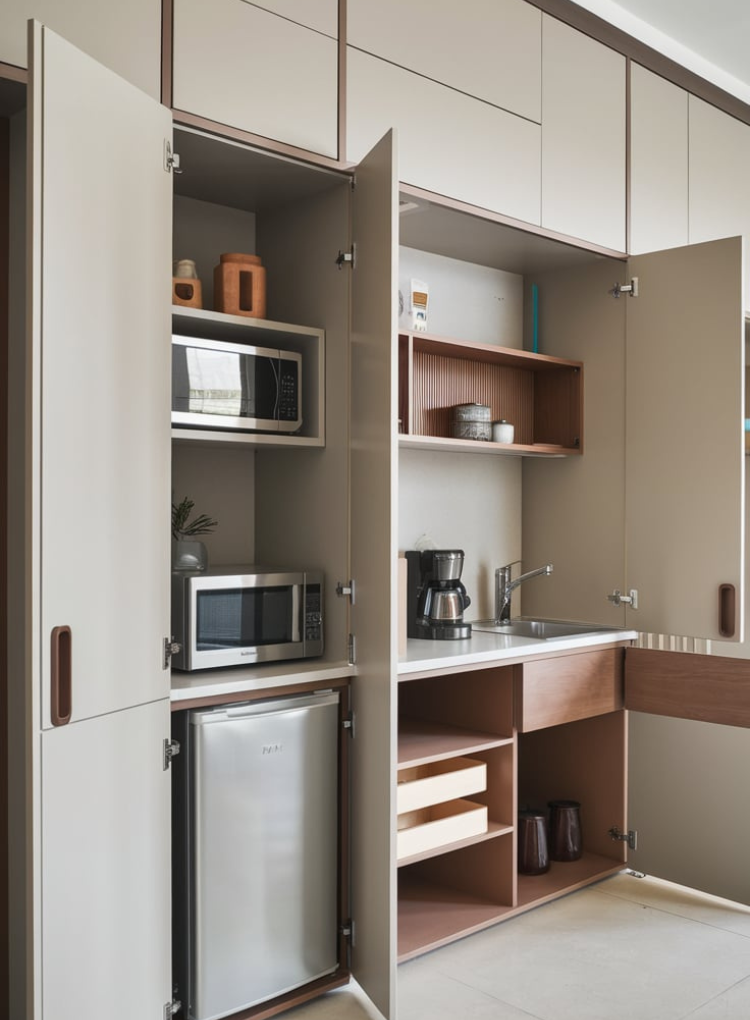When planning your living space, deciding between a kitchen vs kitchenette can have a big impact on your daily life.
Both spaces serve the purpose of meal preparation, but they differ significantly in terms of size, functionality, cost, and purpose. Below, we’ll dive deep into the key differences between a kitchen and.
kitchenette to help you make an informed decision about which one is right for your home or apartment.
What Is a Kitchenette?
A kitchenette is a small, compact cooking area designed for basic food preparation.
These are commonly found in smaller living spaces such as studio apartments, guest rooms, dormitories, and office spaces.
While they don’t offer the full range of appliances that a full kitchen does, they provide essential features like a sink, mini-fridge, and microwave, making them ideal for light cooking tasks.

Also Read: 15 Budget-Friendly Kitchenette Appliances Under $50
Key Features of a Kitchenette:
- Compact size – Fits small spaces like studios, dorms, or offices.
- Basic appliances – Mini fridge, microwave, hot plate, toaster oven, or coffee maker.
- Small sink – Limited counter space for washing dishes or food prep.
- Minimal storage – Small cabinets, shelves, or a kitchen cart.
- No full oven/dishwasher – Relies on portable or multipurpose alternatives.
- Space-saving design – Often doubles as a workspace or dining area.
Pros of a Kitchenette
- Saves Space – Perfect for small apartments, dorms, offices, or tiny homes.
- Affordable – Lower cost than a full kitchen (cheaper appliances, less cabinetry).
- Low Maintenance – Fewer surfaces and appliances to clean.
- Portable & Flexible – Can use modular units or carts; easy to rearrange.
- Quick Setup – No major renovations—often just plug-in appliances.
- Energy Efficient – Smaller fridge and appliances use less power.
- Great for Minimalists – Only essentials, reducing clutter.
- Ideal for Rentals – Landlords can add one without expensive upgrades.
- Good for Light Cooking – Handles basics like reheating, coffee, and simple meals.
- Modern Look – Sleek and compact design fits contemporary spaces.
Best for: Minimalists, urban dwellers, students, or anyone who prioritizes convenience over full cooking capabilities.
Cons of a Kitchenette
- Limited Cooking Ability – No full oven/stovetop; struggles with complex meals.
- Minimal Storage – Small cabinets/fridges make bulk cooking or grocery shopping hard.
- Cramped Workspace – Tight counter space makes meal prep inconvenient.
- No Dishwasher – Handwashing dishes can be tedious.
- Poor Ventilation – Often lacks a proper exhaust fan, causing odors/smoke buildup.
- Not for Families – Too small for multiple cooks or large meals.
- Less Resale Value – Homes/rentals with only a kitchenette may appeal less to buyers.
- Appliance Limitations – Microwaves/hot plates can’t replace full cooking tools.
- Noisy in Small Spaces – Appliances like microwaves may disrupt nearby areas.
Best Avoided For: Serious home chefs, families, or those who entertain often.
What Is a Kitchen?
A kitchen is a much larger and more fully equipped cooking area. Kitchens are designed for preparing meals on a larger scale and often serve as a central hub for family gatherings and socializing.
Kitchens are typically found in larger homes, apartments, and houses where space isn’t as limited.
In a full kitchen, you’ll find all the major appliances and amenities needed for elaborate meal prep and entertaining guests.

Also Read: 15 Space-Saving Kitchenette Designs for Apartments
Key Features of a Kitchen:
- Size: Kitchens offer significantly more space compared to kitchenettes. They usually include counter space, cabinetry for storage, and room for larger appliances like ovens, stoves, and dishwashers. This makes them ideal for larger families or anyone who enjoys cooking frequently.
- Appliances: A kitchen is equipped with full-sized appliances, such as a refrigerator, oven, stove, and dishwasher. These appliances allow for a wide range of cooking options, from simple meals to elaborate dishes. Some kitchens may even include additional amenities like kitchen islands or breakfast bars for added functionality and seating.
- Purpose: Kitchens are designed for full meal preparation and offer space for storing ingredients, prepping meals, and cooking. They also make it easy to entertain guests, with plenty of room to serve food and socialize. If you regularly cook for multiple people or host dinner parties, a full kitchen is a must-have.
- Cost: Kitchens are more expensive to install and maintain than kitchenettes due to their larger size, greater complexity, and higher-quality materials. Factors like custom cabinetry, countertops, and kitchen appliances all contribute to the overall cost of a kitchen remodel.
Key Differences Between a Kitchen and a Kitchenette
| Feature | Kitchen | Kitchenette |
|---|---|---|
| Size | Full-sized, dedicated room | Compact, often part of another space |
| Appliances | Full oven, fridge, dishwasher | Mini-fridge, microwave, hot plate |
| Cooking | Handles complex meals | Basic reheating/simple prep |
| Storage | Ample cabinets + pantry | Minimal shelves/drawers |
| Sink | Large, often double-basin | Small, bar-sized |
| Ventilation | Range hood standard | Often missing or small fan |
| Cost | Higher (installation/appliances) | Budget-friendly |
| Best For | Families, home chefs | Singles, dorms, small spaces |
Summary: Kitchens offer full functionality; kitchenettes prioritize space-saving convenience.
Also Read: 15 Budget-Friendly Kitchenette Lighting Ideas
Choosing Between a Kitchen and a Kitchenette
Here’s a practical guide to help you decide between a kitchen and a kitchenette:
Choose a FULL KITCHEN if you:
- Cook daily or prepare complex meals
- Need to feed a family or entertain guests
- Require full-sized appliances (oven, dishwasher)
- Have space for proper storage and food prep
- Want to increase your property value
- Need heavy-duty ventilation for frequent cooking
Opt for a KITCHENETTE if you:
- Live in a small space (studio, dorm, tiny home)
- Mostly reheat meals or do simple cooking
- Have minimal storage needs
- Want lower installation/maintenance costs
- Need a temporary or secondary cooking space
- Prioritize space-saving over full functionality
Hybrid Solution: Consider a “compact kitchen” with:
- Slim full-size appliances
- Fold-down counter extensions
- Multi-functional storage
- Combination microwave/convection oven
Pro Tip: Evaluate your actual cooking habits – many people with full kitchens primarily use just a few basic functions that could be handled by a well-designed kitchenette.
Also Read: 15 Jaw-Dropping Kitchenette Cabinet Colors
How Big Are Kitchenettes?
Kitchenettes typically range from 10 to 70 square feet, with layouts designed for tight spaces. Here’s the breakdown:
1. Ultra-Compact (10-20 sq ft)
- Example: Hotel room gallery
- Features:
• 24″ mini-fridge
• Single-burner induction cooktop
• Microwave combo oven
• 15″ bar sink
• 18″ of counter space
2. Standard (20-50 sq ft)
- Example: Studio apartment L-shape
- Features:
• 18″ dishwasher drawer
• 2-burner cooktop
• 30″ apartment-sized fridge
• 24″ base cabinets
• Stackable washer/dryer option
3. Extended (50-70 sq ft)
- Example: ADU or micro-unit
- Features:
• 24″ built-in oven
• 36″ sink base
• Pull-out pantry storage
• Breakfast bar seating
Key Space Savers:
- Depth: Standard counters are 24″ deep, but kitchenettes often use 18″
- Height: Appliance garages or tall slim cabinets (84″-96″)
- Flexible: Fold-down tables or retractable counter extensions
Visual Tip: A 5’x7′ (35 sq ft) kitchenette fits:
[← 24″ fridge] [18″ counter] [24″ sink] [12″ dishwasher] →
With upper cabinets and a 24″ cooktop opposite.
What You CAN Cook?
Absolutely! While limited compared to full kitchens, kitchenettes can handle most basic cooking needs with smart strategies. Here’s what you need to know:
What You CAN Cook:
- Breakfasts: Omelets (hot plate), toast (toaster oven), oatmeal (microwave)
- Lunches: Grilled cheese (panini press), ramen (electric kettle), salads (no-cook)
- Dinners: Pasta (single burner), stir-fry (electric skillet), baked potatoes (microwave)
- Snacks: Microwave popcorn, air-fryer wings, charcuterie boards
Pro Kitchenette Cooking Hacks:
- Multi-Task Appliances:
- Instant Pot (pressure cooks + slow cooks + sautés)
- Air Fryer Toaster Oven (bakes + broils + air fries)
- Induction Burner (faster boiling than traditional stoves)
- Space-Saving Gear:
- Nesting cookware sets
- Magnetic spice racks
- Collapsible colanders/silicone bowls
- No-Cook Meals:
- Overnight oats
- Mason jar salads
- Ceviche or tartare
Limitations to Accept:
• Batch cooking = difficult (no large pots)
• Thanksgiving turkey = impossible (no oven)
• Simultaneous dishes = challenging (1-2 burners max)
Realistic Meal Plan Example:
Breakfast: Microwave scrambled eggs + avocado toast
Lunch: Instant Pot quinoa bowl with pre-chopped veggies
Dinner: Single-burner shrimp stir-fry (pre-mixed sauce)
With proper planning, you can make about 85% of everyday meals. It’s all about embracing simplicity and creative appliance use! Want meal ideas tailored to your specific kitchenette appliances?
Conclusion:
Whether you opt for a full kitchen or a kitchenette depends largely on your space, budget, and cooking needs.
A kitchen is perfect for those who love to cook and entertain, while a kitchenette offers a more compact and affordable option for basic meal prep.
Both options can be tailored to fit your specific needs and lifestyle.
Also, don’t forget to update your home with house making ideas. Let us make your home look beautiful.
